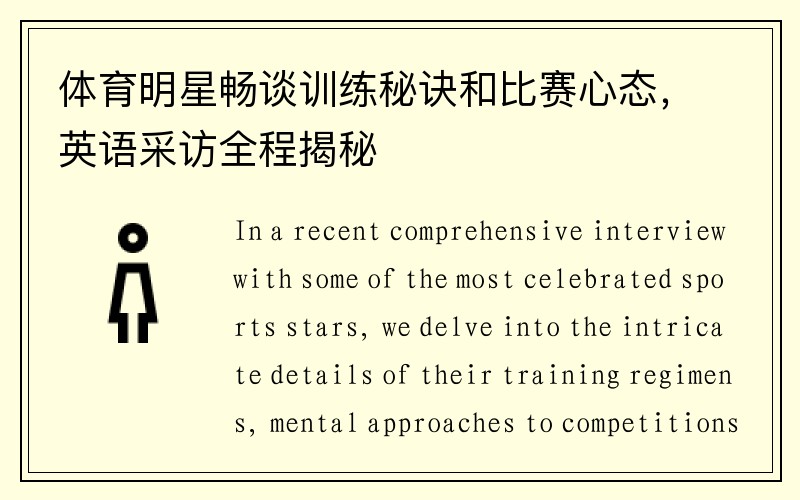体育明星
首页 / Our News /体育明星畅谈训练秘诀和比赛心态,英语采访全程揭秘体育明星畅谈训练秘诀和比赛心态,英语采访全程揭秘
In a recent comprehensive interview with some of the most celebrated sports stars, we delve into the intricate details of their training regimens, mental approaches to competitions, and how these elements contribute to their success. This article provides a thorough exploration of their training secrets, mental strategies, and the profound insights shared during an extensive English-language interview. Through four key aspects—Training Techniques, Mental Fortitude, Competition Preparation, and Post-Game Reflection—we uncover the methodologies and mindsets that propel these athletes to the pinnacle of their sports. The following sections will provide an in-depth look at each of these aspects, offering a clearer picture of the dedication and mental strength required to excel in the competitive world of sports.

1. Training Techniques
The foundation of any elite athlete's success lies in their rigorous training routines. According to our interviewees, training techniques are meticulously designed to enhance performance, prevent injuries, and build resilience. For instance, many sports stars emphasize the importance of periodization—breaking down the training year into distinct phases to peak at the right moments. This approach allows them to balance intensity and recovery, ensuring that they are in optimal shape during critical competitions.
Moreover, modern training regimens incorporate cutting-edge technology to track progress and optimize workouts. Athletes often use wearable devices to monitor metrics such as heart rate variability, sleep quality, and workload. This data-driven approach enables them to make real-time adjustments to their training plans, ensuring continuous improvement and adaptation.
乐动·体育官方网站Another key aspect of their training is the focus on mental and emotional conditioning. Techniques such as visualization and mindfulness are integrated into their routines to help athletes remain calm and focused under pressure. By visualizing success and practicing mindfulness, they can enhance their concentration and reduce anxiety, which are crucial for peak performance.
2. Mental Fortitude
Winning in sports is as much about mental strength as it is about physical ability. Our interviewees highlighted that mental fortitude is developed through various strategies and practices. One common approach is the use of positive self-talk and affirmations. Athletes often use these techniques to build confidence and maintain a positive mindset, even when faced with setbacks or challenges.
Another crucial element of mental fortitude is the ability to manage stress and anxiety. Many sports stars work with sports psychologists to develop coping mechanisms for high-pressure situations. Techniques such as cognitive restructuring—reframing negative thoughts into positive ones—help athletes stay focused and resilient during competitions.
Additionally, maintaining a balanced life outside of sports is essential for mental well-being. Athletes often engage in hobbies, spend time with family and friends, and practice relaxation techniques to ensure they remain well-rounded individuals. This balance helps them stay motivated and reduces the risk of burnout, allowing them to perform consistently at their best.
3. Competition Preparation
Preparing for competition involves a multifaceted approach that extends beyond physical training. One critical aspect is the development of a detailed game plan. Athletes often study their opponents, analyze past performances, and strategize on how to approach each match or event. This level of preparation ensures they are well-informed and ready to adapt to various scenarios during the competition.
In addition to tactical preparation, athletes also focus on optimizing their pre-competition routines. This includes everything from nutritional strategies to ensuring adequate rest and recovery. Many sports stars follow strict diets and hydration plans tailored to their specific needs, ensuring they are in peak condition when it matters most.
Moreover, mental rehearsal plays a significant role in competition preparation. Athletes often engage in mental practice, where they visualize themselves executing their techniques flawlessly. This not only boosts their confidence but also helps in refining their skills and strategies, making them more prepared for the actual competition.
4. Post-Game Reflection
Post-game reflection is an integral part of an athlete's development and success. After each competition, athletes review their performance to identify strengths and areas for improvement. This reflective practice involves analyzing game footage, discussing strategies with coaches, and setting new goals based on the outcomes.
Another important aspect of post-game reflection is managing emotions. Winning and losing can evoke strong emotional responses, and athletes need to process these feelings constructively. Many engage in debriefing sessions with their support teams to discuss their emotional state and how to use these experiences to fuel future growth.
Additionally, setting new objectives and adjusting training plans based on recent performances is crucial. This ongoing process of evaluation and adaptation helps athletes stay motivated and continuously improve, ensuring they remain competitive and achieve long-term success in their sports careers.
In conclusion, the insights shared by these sports stars highlight the intricate balance between physical training and mental strategies that contribute to their success. Their detailed training techniques, mental fortitude, thorough competition preparation, and reflective practices provide a comprehensive understanding of what it takes to excel in the world of sports. By implementing these principles, aspiring athletes can gain valuable lessons on how to approach their own training and competition endeavors, ultimately leading to their own achievements and personal growth.
The journey to athletic excellence is paved with dedication, strategic planning, and continuous self-improvement. As we have explored through these interviews, the combination of rigorous training, mental resilience, meticulous preparation, and reflective practices forms the cornerstone of a successful sports career. Embracing these principles not only enhances performance but also fosters a mindset geared towards achieving greatness and overcoming challenges.
搜索
最新内容

青岛足球比赛实时直播平台为您带来精彩赛事观赛体验

西山足球比赛精彩直播全程回顾助你错过不再遗憾

激情四溢校园足球赛精彩纷呈精彩直播让你不容错过的青春碰撞

抚顺少年足球比赛精彩直播展现新一代足球天赋与激情

咸安区足球比赛精彩直播视频全程回放,畅享激烈赛事瞬间

中山省运会足球赛精彩直播全程跟踪展现激情对决